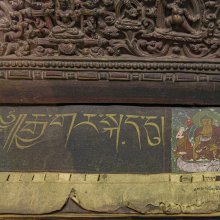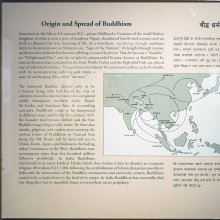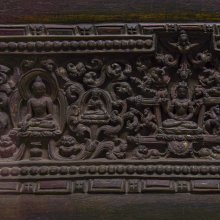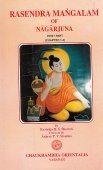Bauddha: 19 definitions
Introduction:
Bauddha means something in Hinduism, Sanskrit, Marathi, Hindi. If you want to know the exact meaning, history, etymology or English translation of this term then check out the descriptions on this page. Add your comment or reference to a book if you want to contribute to this summary article.
Alternative spellings of this word include Baudh.
Images (photo gallery)
(+16 more images available)
In Hinduism
Shaivism (Shaiva philosophy)
Source: Shodhganga: Iconographical representations of ŚivaBauddha (बौद्ध) or Bauddhāgama refers to one of upāgamas (supplementary scriptures) of the Kiraṇāgama which is one of the twenty-eight Siddhāntāgama: a classification of the Śaiva division of Śaivāgamas. The Śaivāgamas represent the wisdom that has come down from lord Śiva, received by Pārvatī and accepted by Viṣṇu. The purpose of revealing upāgamas (e.g., Bauddha Āgama) is to explain more elaborately than that of mūlāgamas (e.g., Kiraṇa-āgama) and to include any new idea if not dealt in mūlāgamas.

Shaiva (शैव, śaiva) or Shaivism (śaivism) represents a tradition of Hinduism worshiping Shiva as the supreme being. Closely related to Shaktism, Shaiva literature includes a range of scriptures, including Tantras, while the root of this tradition may be traced back to the ancient Vedas.
Shaktism (Shakta philosophy)
Source: Google Books: ManthanabhairavatantramBauddha (बौद्ध) refers to one of the spiritual disciplines (darśana—systems) issued from the limbs of the body of the Goddess, according to the Manthānabhairavatantra, a vast sprawling work that belongs to a corpus of Tantric texts concerned with the worship of the goddess Kubjikā.—[...] All spiritual disciplines, whatever the tradition, are necessarily grounded in the same energy of the Śāmbhava state. They issue, as the texts put it, from the limbs of the body of the goddess who is this energy. These range from the lowest extremity—the left big toe—where Buddhism originates, to the highest—the End of Sixteen—where the Śāmbhava state is attained which is the source of the Kubjikā tradition. The systems (darśana) and their corresponding places of origin in the Goddess’s body are as follows: [1) Bauddha—right big toe—pādāṅguṣṭa, ...].
Source: ORA: Amanaska (king of all yogas): (shaktism)Bauddha (बौद्ध) refers to “followers of the Buddhists principles”, according to the 17th century Kaulagajamardana (“crushing the Kaula elephant”) authored by Kāśīnātha or Kṛṣṇānandācala.—Accordingly, [as Īśvara said to Pārvatī]: “[...] O great Goddess, hear about the Jain. He always carries a pitcher. He is simply a soul and never an enjoyer, doer and destroyer. He is called a Jain, and Buddhists (bauddha) and [the like] are considered [to be similar]. Some pluck out their hair and dress in white, my dear, and [some] wear red garments and [others wear] indigo and so on. Some are called, 'great guru', and others pursue nonviolence. These are the different varieties in brief; they are [all] called Pāṣaṇḍas [because] they have been excluded from the vedic path. [...]”

Shakta (शाक्त, śākta) or Shaktism (śāktism) represents a tradition of Hinduism where the Goddess (Devi) is revered and worshipped. Shakta literature includes a range of scriptures, including various Agamas and Tantras, although its roots may be traced back to the Vedas.
Yoga (school of philosophy)
Source: ORA: Amanaska (king of all yogas): A Critical Edition and Annotated Translation by Jason BirchBauddha (बौद्ध) refers to a “Buddhist”, according to the Dattātreyayogaśāstra 41-42.—Accordingly, “Whether a Brahmin, an ascetic, a Buddhist (Bauddha), a Jain, a Skull-Bearer or a materialist, the wise man who is endowed with faith and constantly devoted to the practice of [haṭha] yoga will attain complete success”.

Yoga is originally considered a branch of Hindu philosophy (astika), but both ancient and modern Yoga combine the physical, mental and spiritual. Yoga teaches various physical techniques also known as āsanas (postures), used for various purposes (eg., meditation, contemplation, relaxation).
Languages of India and abroad
Marathi-English dictionary
Source: DDSA: The Molesworth Marathi and English Dictionarybauddha (बौद्ध).—m (S) The name of the ninth incarnation of viṣṇu. 2 A Buddhist or follower of Buddh. bauddhāvatāra dharaṇēṃ or ghēṇēṃ To sit doggedly silent.
--- OR ---
bauddha (बौद्ध).—a S Invented, conceived, formed by buddhi or the understanding; imaginary, ideal, fictitious.
Source: DDSA: The Aryabhusan school dictionary, Marathi-Englishbauddha (बौद्ध).—m The name of the 9th incarnation of viṣṇu. A Buddhist.
Marathi is an Indo-European language having over 70 million native speakers people in (predominantly) Maharashtra India. Marathi, like many other Indo-Aryan languages, evolved from early forms of Prakrit, which itself is a subset of Sanskrit, one of the most ancient languages of the world.
Sanskrit dictionary
Source: DDSA: The practical Sanskrit-English dictionaryBauddha (बौद्ध).—a. (-ddhī f.) [बुद्ध-द्धि अण् (buddha-ddhi aṇ)]
1) Relating to Buddhi or understanding; mental.
2) Relating to Buddha.
-ddhaḥ A follower of the religion taught by Buddha.
Source: Cologne Digital Sanskrit Dictionaries: Edgerton Buddhist Hybrid Sanskrit DictionaryBauddha (बौद्ध).—adj., of (a) Buddha: °dhaṃ…yānaṃ Saddharmapuṇḍarīka 91.12 (verse), compare buddha-yāna (= mahāyāna); °dhasmi (so with WT and their ms. Ḱ; KN baudhasmi) jñānasmi Saddharmapuṇḍarīka 323.9 (verse); °dhā vikurvitaviyūha vidarśayanti Gaṇḍavyūha 373.3 (verse); °dha-vaineyaka, to be trained by Buddha, °kā sattvā Mahāvastu i.51.4 (prose; = buddha-vaineya, see s.v. vaineya).
Source: Cologne Digital Sanskrit Dictionaries: Shabda-Sagara Sanskrit-English DictionaryBauddha (बौद्ध).—m.
(-ddhaḥ) A Baudd'ha, or follower of the religion of the Budd'has. E. buddha a Budd'ha, aṇ aff.
Source: Cologne Digital Sanskrit Dictionaries: Benfey Sanskrit-English DictionaryBauddha (बौद्ध).—i. e. buddha + a, m. A follower of the Bauddha religion, [Vedāntasāra, (in my Chrestomathy.)] in
Bauddha (बौद्ध).—[adjective] borne in mind (not spoken out), relating to the intellect or to Buddha; [masculine] a Buddhist.
Source: Cologne Digital Sanskrit Dictionaries: Monier-Williams Sanskrit-English Dictionary1) Bauddha (बौद्ध):—[from budh] mf(ī)n. ([from] buddhi) being in the mind, mental (= not uttered), [Vāmana’s Kāvyālaṃkāravṛtti v, 2, 62]
2) [v.s. ...] relating to intellect or understanding, [Sāhitya-darpaṇa]
3) [v.s. ...] ([from] buddha), relating or belonging to Buddha, Buddhist, [Prabodha-candrodaya; Rājataraṅgiṇī; Vedāntasāra] etc. (cf. [Monier-Williams’ Buddhism 529, t]).
Source: Cologne Digital Sanskrit Dictionaries: Yates Sanskrit-English DictionaryBauddha (बौद्ध):—(ddhaḥ) 1. m. A Bauddha.
Source: DDSA: Paia-sadda-mahannavo; a comprehensive Prakrit Hindi dictionary (S)Bauddha (बौद्ध) in the Sanskrit language is related to the Prakrit words: Buddha, Boddha.
[Sanskrit to German]
Sanskrit, also spelled संस्कृतम् (saṃskṛtam), is an ancient language of India commonly seen as the grandmother of the Indo-European language family (even English!). Closely allied with Prakrit and Pali, Sanskrit is more exhaustive in both grammar and terms and has the most extensive collection of literature in the world, greatly surpassing its sister-languages Greek and Latin.
Hindi dictionary
Source: DDSA: A practical Hindi-English dictionaryBauddha (बौद्ध) [Also spelled baudh]:—(a) Buddhist; pertaining or belonging to Lord Buddha or the religion propounded by him; (nm) a Buddhist; follower of Lord Buddha and his religion; -[dharma/mata] Buddhism, Buddhist faith; -[vihāra] a Buddhist monastery.
...
Kannada-English dictionary
Source: Alar: Kannada-English corpusBauddha (ಬೌದ್ಧ):—
1) [adjective] of, relating to, derived from or appealing to the intellect; intellectual.
2) [adjective] of or relating to Gautama Buddha or Buddhism.
--- OR ---
Bauddha (ಬೌದ್ಧ):—
1) [noun] the ninth major incornation of Viṣṇu, as Gautama Buddha.
2) [noun] a follower of Buddhism.
Kannada is a Dravidian language (as opposed to the Indo-European language family) mainly spoken in the southwestern region of India.
Nepali dictionary
Source: unoes: Nepali-English DictionaryBauddha (बौद्ध):—adj. intellectual; wise; pertaining to Buddha; n. 1. Buddhist; 2. Boudhanath; a famous stupa in Kathmandu;
Nepali is the primary language of the Nepalese people counting almost 20 million native speakers. The country of Nepal is situated in the Himalaya mountain range to the north of India.
See also (Relevant definitions)
Starts with (+7): Bauddhabhikshu, Bauddhadarshana, Bauddhadhama, Bauddhadharm, Bauddhadharma, Bauddhadhikaravivarana, Bauddhadhikkara, Bauddhadhikkaradidhiti, Bauddhadhikkaragadadhari, Bauddhadhikkaragunanandi, Bauddhadhikkararahasya, Bauddhadushana, Bauddhagama, Bauddhaka, Bauddhamata, Bauddhamatadushana, Bauddhamatanivarhana, Bauddharaddhanta, Bauddharupa, Bauddhasamgati.
Full-text (+147): Buddha, Vauddha, Bhadanta, Vajrakapalin, Advaya, Bauddhashastra, Bauddhamata, Prajnakaya, Akanishtha, Pratyakshavadin, Vedanindaka, Bauddhamatadushana, Bauddhamatanivarhana, Vaineyaka, Bauddhadushana, Bauddhadarshana, Pancagupta, Bauddhadhikkara, Bauddhadhikkaradidhiti, Bauddhadhikkararahasya.
Relevant text
Search found 82 books and stories containing Bauddha; (plurals include: Bauddhas). You can also click to the full overview containing English textual excerpts. Below are direct links for the most relevant articles:
The Concept of Sharira as Prameya (by Elizabeth T. Jones)
Brahma Sutras (Shankaracharya) (by George Thibaut)
II, 2, 23 < [Second Adhyāya, Second Pāda]
II, 2, 24 < [Second Adhyāya, Second Pāda]
II, 2, 18 < [Second Adhyāya, Second Pāda]
Brahma Sutras (Shankara Bhashya) (by Swami Vireshwarananda)
Chapter II, Section II, Adhikarana V < [Section II]
Chapter II, Section II, Adhikarana IV < [Section II]
Chapter II, Section II, Adhikarana VI < [Section II]
Vakyapadiya of Bhartrihari (by K. A. Subramania Iyer)
Verse 3.1.99 < [Book 3 - Pada-kāṇḍa (1): Jāti-samuddeśa (On the Universal)]
Verse 3.3.27 < [Book 3 - Pada-kāṇḍa (3): Sambandha-samuddeśa (On Relation)]
Verse 2.135 < [Book 2 - Vākya-kāṇḍa]
Brahma Sutras (Ramanuja) (by George Thibaut)
Sutra 2.2.18 < [Second Adyaya, Second Pada]
Sutra 2.2.17 < [Second Adyaya, Second Pada]
Sutra 2.2.27 < [Second Adyaya, Second Pada]
A comparative study between Buddhism and Nyaya (by Roberta Pamio)
2. The concept of Reality in the Four Buddhist Schools < [Chapter 2 - The Four Buddhist Schools of Philosophy]
2. Comparative study on Perception < [Chapter 5 - Perception: A Comparative Study]
Indian and Buddhist Epistemology: an Introduction < [Introduction]
Related products







